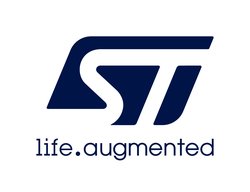NUCLEO-WB55RG
Affordable and flexible platform to ease prototyping using a STM32WB55RGVx microcontroller.
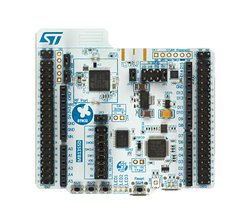
Overview¶
The NUCLEO-WB55RG is a multi-protocol wireless and ultra-low-power device embedding a powerful and ultra-low-power radio compliant with the Bluetooth® Low Energy (BLE) SIG specification v5.0 and with IEEE 802.15.4-2011. This Nucleo-64 is available as a standalone NUCLEO-WB55RG product but also integrated into the P-NUCLEO-WB55 product pack. The NUCLEO-WB55RG allows to simply and quickly evaluate STM32WB55xx and STM32WB35xx devices.
Microcontroller features¶
- STM32WB microcontroller in a VFQFPN68 package
- 2.4 GHz RF transceiver supporting Bluetooth® specification v5.0 and IEEE 802.15.4-2011 PHY and MAC
- Dedicated Arm® 32-bit Cortex® M0+ CPU for real-time Radio layer
- Includes ST state-of-the-art patented technology
- Arm® 32-bit Cortex®-M4 CPU with FPU
- Adaptive real-time accelerator (ART Accelerator™) allowing 0-wait-state execution from Flash memory
- frequency up to 64 MHz, MPU, 80 DMIPS and DSP instructions
- Up to 1 MB Flash memory with sector protection (PCROP) against R/W operations
- Up to 256 KB SRAM, including 64 KB with hardware parity check
- 20x32-bit backup register
- Boot loader supporting, USART, SPI, I2C and USB interfaces
- OTA (Over the air) Bluetooth® Low Energy and 802.15.4 update
- Quad SPI memory interface with XIP
- 12-bit ADC
- Inter processor communication controller (IPCC) for communication with Bluetooth® Low Energy and 802.15.4
- HW semaphores for resources sharing between CPUs
- DMA controllers (2)
- USART (1)
- LPUART (low power) (1)
- SPI 32 Mbit/s (2)
- I2C (SMBus/PMBus) (2)
- SAI (dual channel high quality audio) (1)
- USB 2.0 FS device, crystal-less, BCD and LPM (1)
- Touch sensing controller, up to 18 sensors
- LCD 8x40 with step-up converter
- Timers 16-bit, four channels advanced (1)
- Timers 16-bits, two channels timer (2)
- Timers 32-bits, four channels timer (1)
- Timers 16-bits ultra-low-power timer (1)
- Independent Systick (1)
- Independent watchdog (1)
- Window watchdog (1)
Nucleo features¶
- Two types of extension resources
- Arduino Uno Revision 3 connectivity
- STMicroelectronics Morpho extension pin headers for full access to all STM32 I/Os
- On-board ST-LINK/V2-1 debugger/programmer with SWD connector
- Selection-mode switch to use the kit as a standalone ST-LINK/V2-1
- Flexible board power supply
- USB VBUS or external source (3.3 V, 5 V, 7 - 12 V)
- Power management access point
- Three user LEDs
- Three user buttons and one reset button
- USB re-enumeration capability: three different interfaces supported on USB
- Virtual Com port
- Mass storage (USB Disk drive) for drag'n'drop programming
- Debug port
Nucleo pinout¶
Pins Legend¶
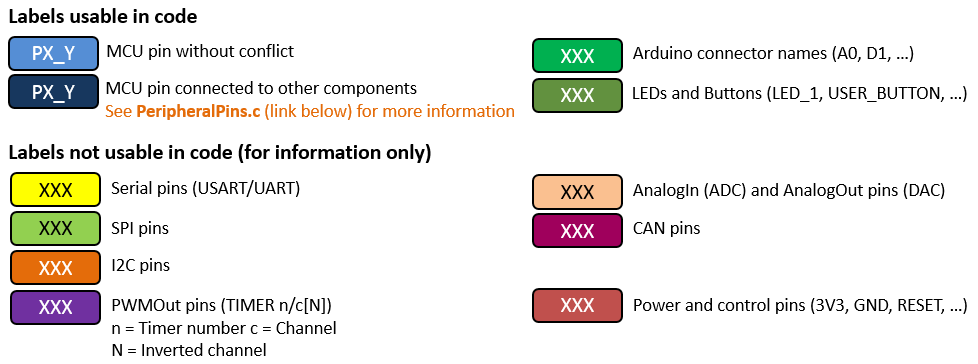
You can find more details on the available pins and labels in the PeripheralPins.c and PinNames.h files.
Arduino-compatible headers¶
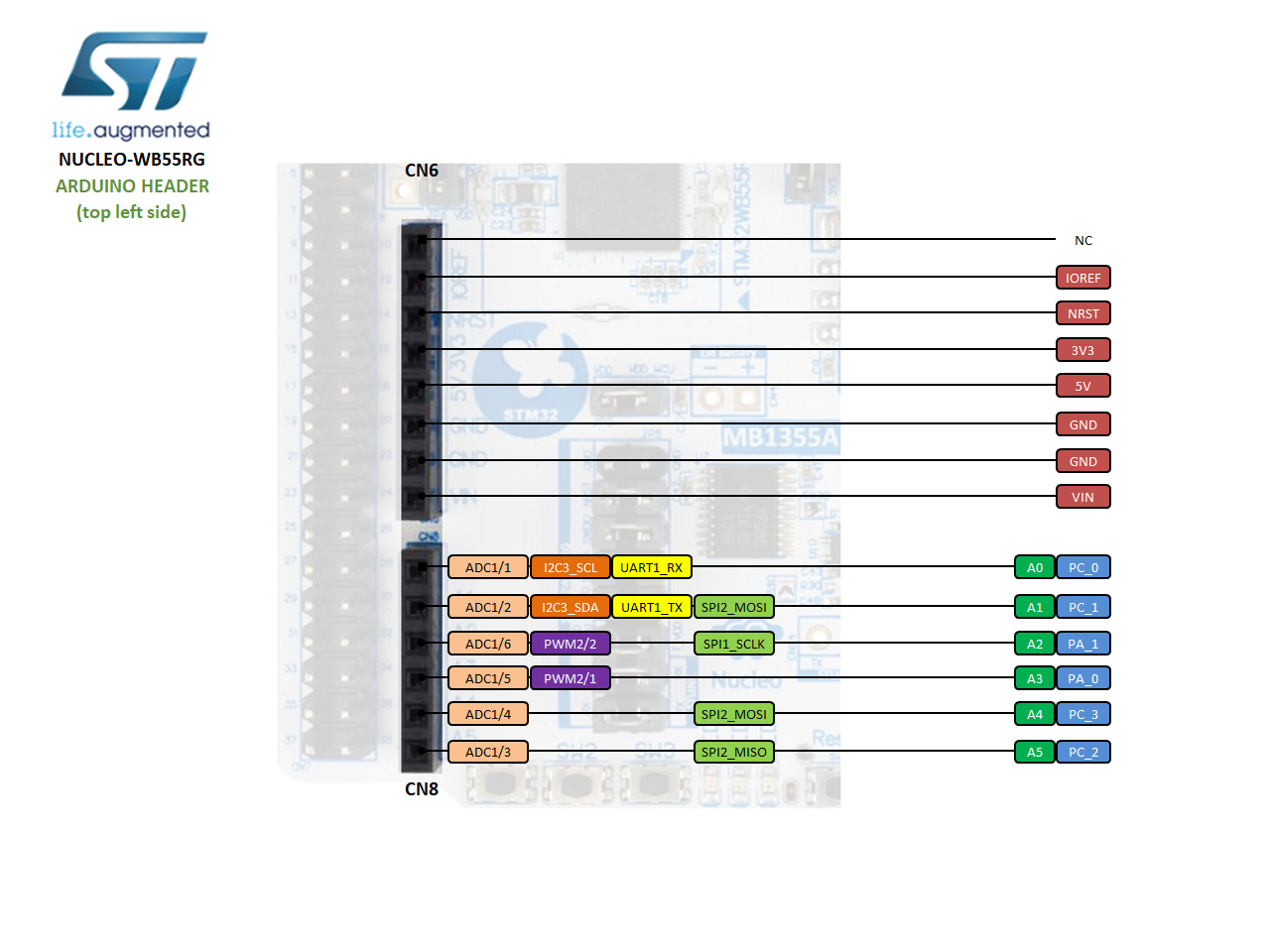
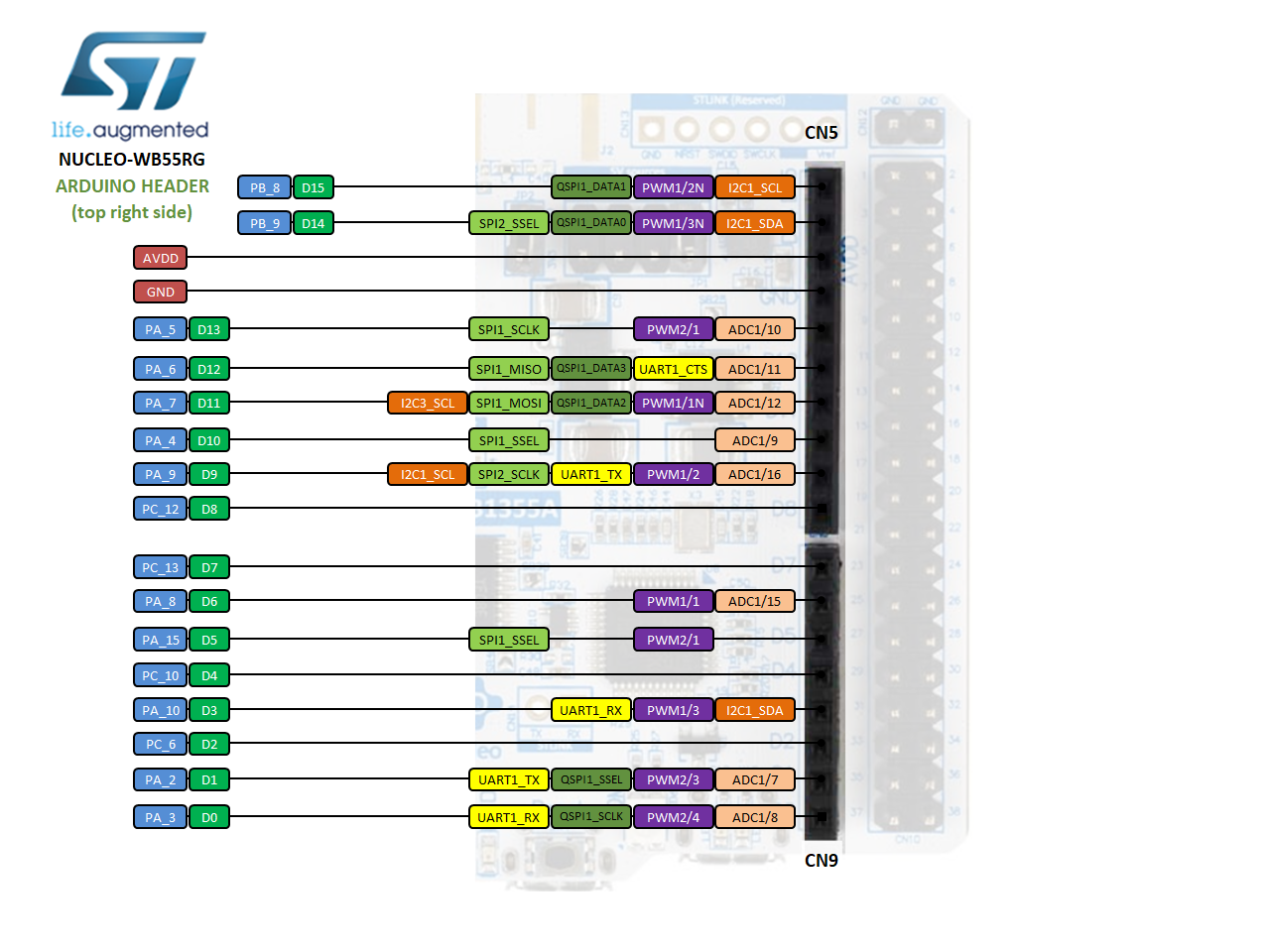
Morpho headers¶
These headers give access to all STM32 pins.
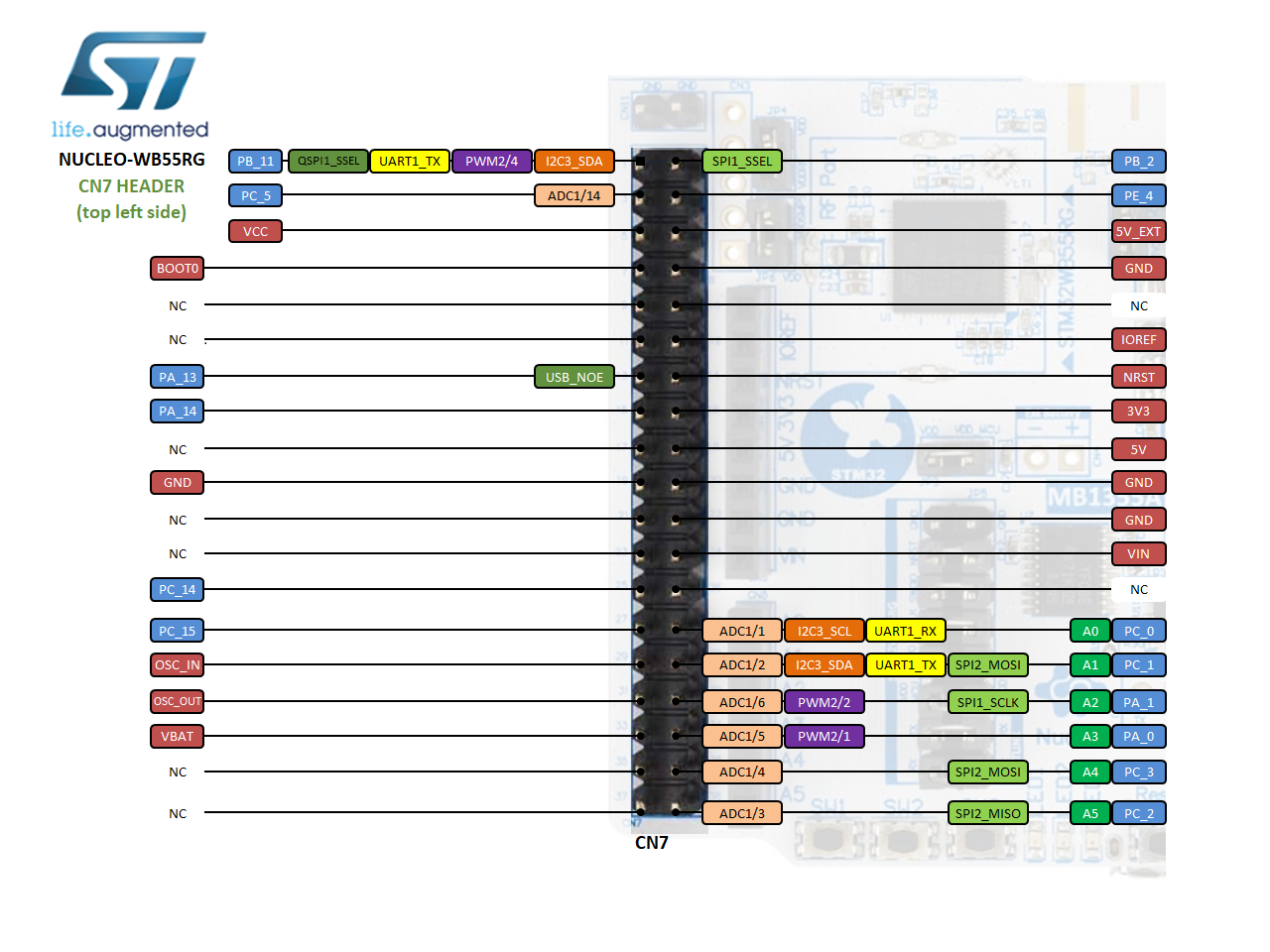
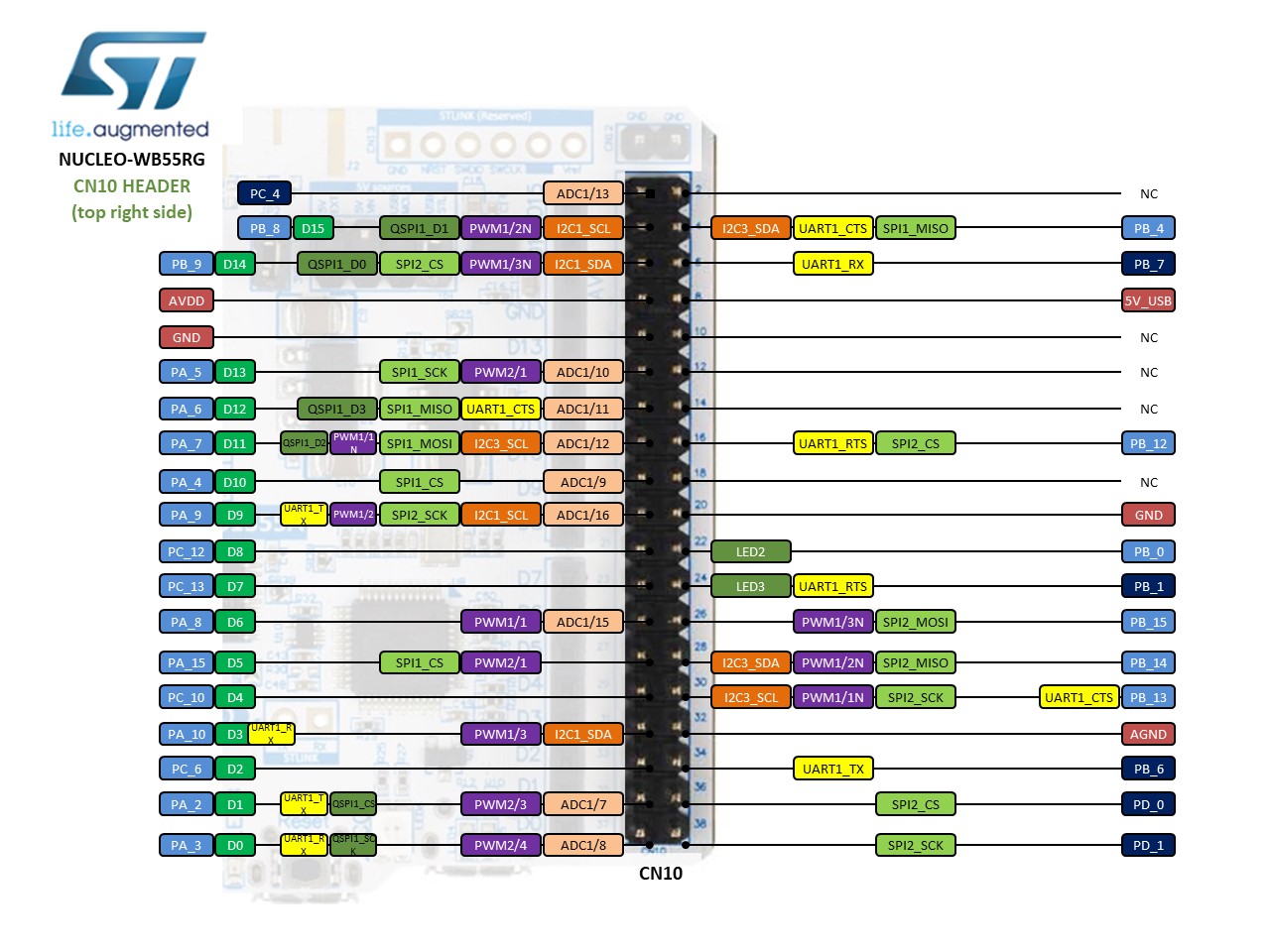
Tips and Tricks¶
https://github.com/ARMmbed/mbed-os/blob/master/targets/TARGET_STM/README.md
Find more information in ST WIKI pages.
BLE FW update¶
Check information: https://github.com/ARMmbed/mbed-os/blob/master/targets/TARGET_STM/TARGET_STM32WB/README.md
Technical references¶
Standalone board : https://www.st.com/en/evaluation-tools/nucleo-wb55rg.html
Pack : https://www.st.com/en/evaluation-tools/p-nucleo-wb55.html
STM32WG55RG : https://www.st.com/en/microcontrollers-microprocessors/stm32wb55rg.html
Known limitations¶
The following section describes known limitations of the platform. Note that general issues are tracked into the mbed repository available on GitHub.
You need to log in to post a discussion
